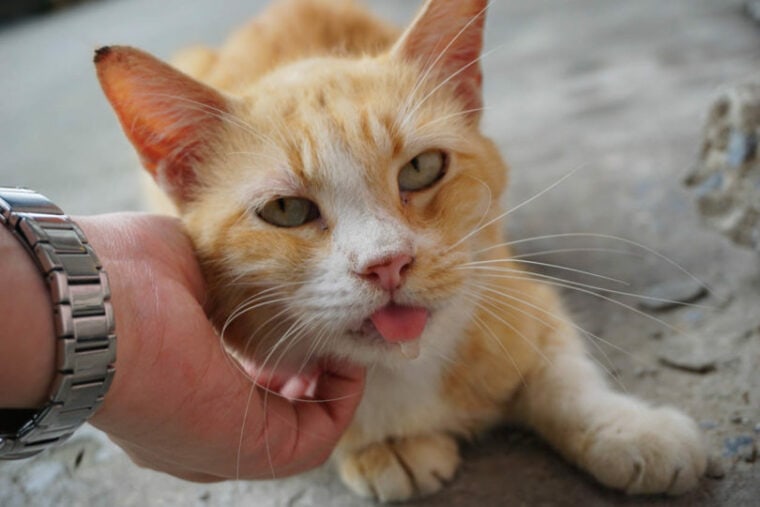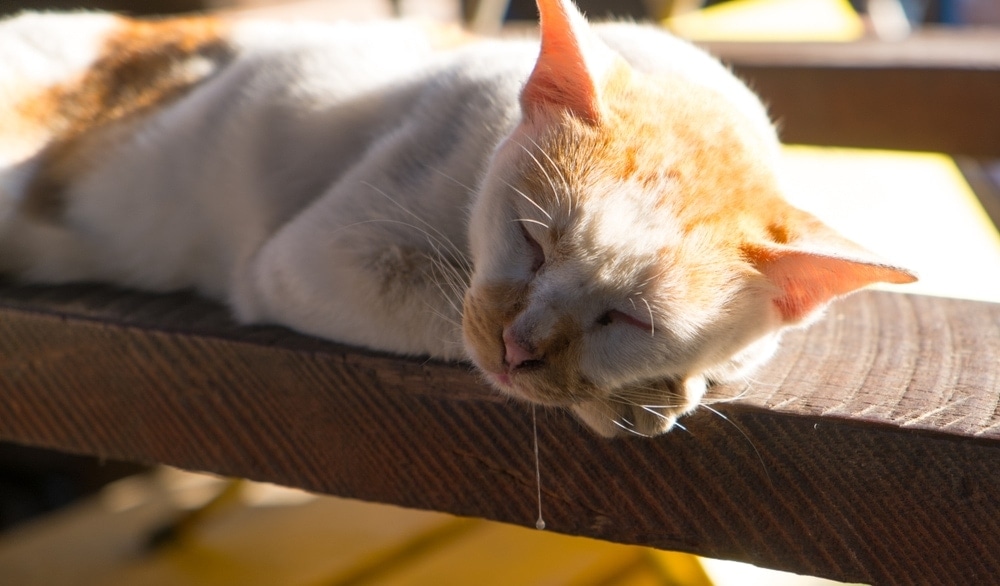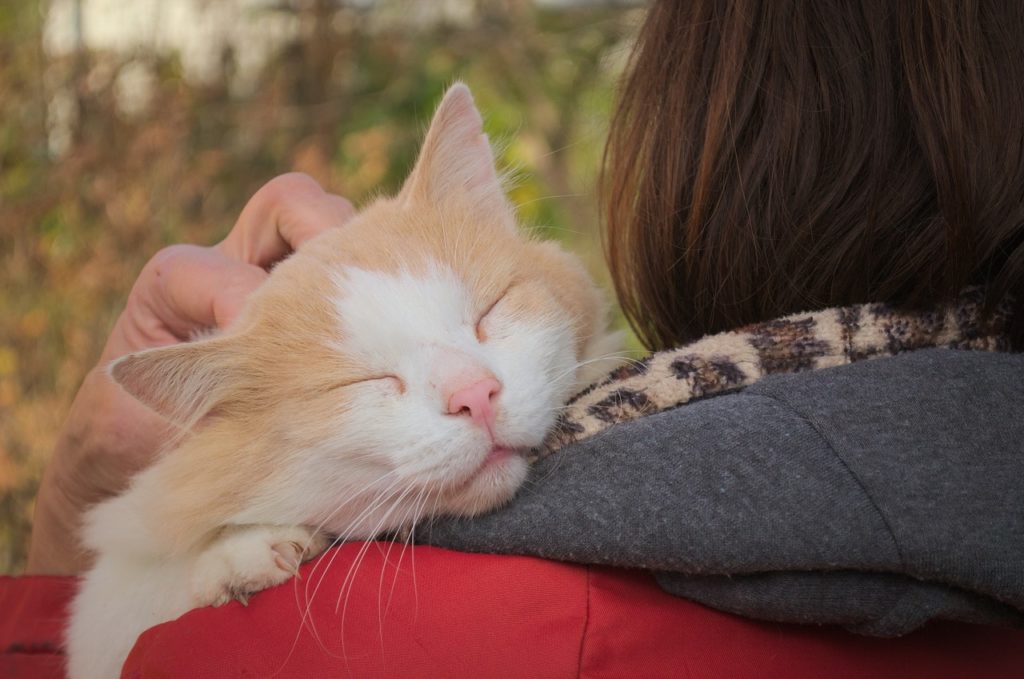
Click to Skip Ahead
Not all cats drool when you pet them and you may notice that your cat drools all the time during cuddles or only occasionally. Luckily, when associated with being pet, this behavior isn’t usually anything to be worried about—it can be completely normal for some cats.
However, not all causes of drooling are benign. In some cases, it may be a sign of an underlying health problem that needs to be corrected. Either way, it’s important to get to the bottom of your cat’s drooling behavior.
Below, we’ve expanded on several reasons why your cat may be drooling when you pet them.
If your cat is suddenly drooling and this occurs mostly unrelated to you petting them, it may be a sign of oral pain, dental disease, oral mass, foreign body at the back of the throat, nausea and stomach upset, mouth ulceration, toxin exposure, and many more. All of these conditions require prompt veterinary attention, so contact your vet if your cat is drooling.
The 4 Likely Reasons Why Cats Drool When You Pet Them
1. Contentment

Some cats drool when they are happy. Typically, these cats will drool regularly and develop the behavior pretty early in their kittenhood. It’s less likely that they would develop this behavior later in life. However, some cats may only drool due to contentment for very specific reasons.
For instance, some cats may only drool when you pet them in their favorite spot, like behind their ears or under their chin. If you pet them somewhere they really like, it may cause them to drool. If you pet them somewhere else, they may not drool.
This behavior is due to endorphins, which are the “feel good” chemical. When your cat is petted, they may become so relaxed and content that they start drooling. They may purr or even knead at the same time.
2. Stress or Anxiety

Cats may also drool when they are stressed or anxious. Therefore, if the cat is uncomfortable being petted, they may drool. It’s important to take a complete look at a cat’s behavior and body language to determine the cause of their drooling. Otherwise, it’s easy to interpret drooling as always positive when it isn’t.
Not all cats drool when stressed, though. Therefore, don’t assume that a cat isn’t stressed just because they aren’t drooling. Just like humans, cats respond to their stress in all sorts of ways, which may include drooling.
This is more common in cats that aren’t used to being handled or are more “high-strung.” If your cat seems otherwise relaxed and is petted all the time, then this probably isn’t the underlying cause of their drooling.
Drooling often occurs when your cat is transported to the vet clinic, while being in a cat carrier in the car, or when being examined by the vet. All of these experiences may be stressful for some cats, which they can exhibit as drooling. Car sickness and unpleasant sensation when in the car may also make some cats feel nauseous, which leads to vomiting and drooling.
3. Dental or Other Mouth Problems

Dental problems in cats are often accompanied by drooling. Oral pain, dental disease, and mouth injuries can all cause excessive drooling. If a cat suddenly starts drooling a lot, this is an important aspect to consider and needs veterinary attention. On the other hand, if your cat drools all the time and hasn’t previously had any dental issues, then drooling isn’t likely tied to any health issues. Your cat’s past behavior is very important in this regard.
If you notice any changes in the amount of drool your cat is producing, it’s important to speak to your vet. Often, dental problems also cause signs like bad breath, pawing at the mouth, refusing dry food and preferring gravy from the wet food, difficulty eating or swallowing, facial swelling, discharge, and behavioral changes. Cats that are sick may also not like to be petted as much as they previously did. They may also be sensitive about the area around their mouth.
Cats can also get foreign bodies stuck in their mouths around the tongue, at the back of their throat, and behind a soft palate. String-like materials, such as ribbons, are often the culprit. These issues occur mostly in young cats and kittens, while other dental and mouth issues, such as cancer, are more common in adult and senior cats. If your cat is bothered with their mouth, is showing any of the above mentioned signs, or they have started drooling suddenly, they should be checked by your vet as soon as possible
4. Other Health Problems

Other than mouth and dental issues, cats may drool if they have a stomach upset, gastrointestinal foreign body or neoplasia, or are feeling nauseous. They can also drool if they have encountered a toxin and are experiencing signs of poisoning, have neurological disorders, systemic disease such as kidney disease, and many others. All of these warrant an urgent check by their veterinarian in order to get down to the root cause and make the cat more comfortable.
Why Do Cats Drool When They Are Happy?
As we’ve discussed, one of the reasons cats drool may be due to happiness. But why do cats drool when they are happy? It’s caused by a combination of physiological and emotional factors. When a cat is contented and enjoying the moment, drooling can be caused by several factors:
It’s important to note that drooling when happy is typically a normal and harmless behavior in cats.

Do Cats Drool When They Love You?
Many cats drool when they are feeling particularly affectionate. While not all cats perform this behavior, it is common enough to be considered normal. However, just because a cat is drooling doesn’t mean they love you or don’t love you.
In fact, drooling can be caused by a range of different things, including dental issues. Therefore, if your cat starts drooling for no apparent reason, it may be time to call a vet.
Final Thoughts
Cats may drool for all sorts of reasons. While not all cats drool, it can be completely normal for some felines and may be associated with positive emotions, such as contentment and happiness. Many cats simply find being petted very relaxing, so much so that they drool, but they would start doing this from a young age. Cats may also drool when grooming, which is similar to drooling due to contentment.
However, drooling is not always a sign of happiness. It can also be a response to stress or anxiety, especially in cats that are not used to being handled or are more sensitive. It’s crucial to observe a cat’s behavior and body language to determine the cause of their drooling accurately. Cats may also drool due to health problems. Cats experiencing oral pain or dental disease may drool more than usual. In these cases, it’s vital to contact your vet.
- See also: 10 Best Cat Cave Beds
Featured Image Credit: Ling Chen, Shutterstock







